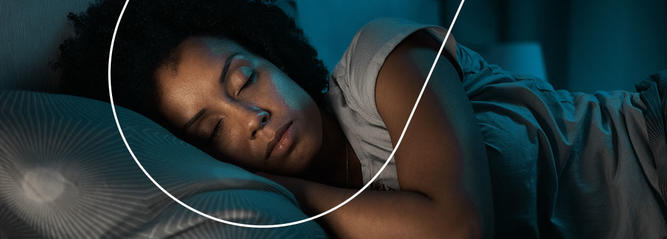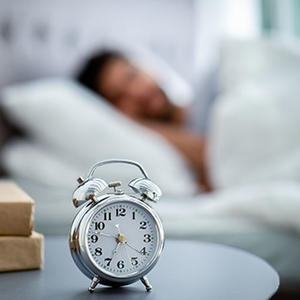As you may have experienced, poor sleep quality and a late bedtime can raise blood sugar levels after breakfast the next morning.5 Getting good, uninterrupted sleep is important to keep your blood sugar at healthy levels. It can also improve how your body handles blood sugar after meals.
Making small, intentional changes to your daily routine can improve your sleep habits and help you get a good night's sleep.4 These changes may also help with sleep disorders or irregular sleep patterns.
Get Cozy
Exercising, doing chores, or running errands right before bed can actually wake you up and make it more difficult to fall asleep. Try to complete these tasks at least one hour before going to bed.
Engage in relaxing activities such as reading a book, taking a warm bath, or practicing breathing exercises. This change in pace signals to your body that it is time to go to sleep.
Go to bed on time
A consistent bedtime is an important part of establishing a routine.4 Do your best to go to bed at the same time every day, even on the weekends, if you can. Avoid napping late in the day, which can interrupt your sleep patterns and make it challenging to get enough rest.
Watch what you eat or drink
What you eat before sleep actually matters.4 It’s good practice to avoid heavy meals right before bedtime, as well as alcohol or caffeine. In fact, limit all of your fluid intake to at least one hour before bedtime so you won’t have to wake up in the middle of the night to go to the bathroom. Just in case, use the bathroom right before bed, too.
Minimize stress
If you feel as though stress and anxiety interfere with your ability to relax and rest, discovering effective ways to manage them is key.
Stress can significantly impact your ability to get a good night's rest. If you find yourself feeling stressed or anxious, relaxation techniques, such as meditating or writing in a journal, can be a helpful way to recenter and refocus your energy.
Set up your environment
A comfortable room can help make it easier for you to fall asleep. Make sure the temperature is not too hot or too cold and that it's quiet and dark. If you use your bedroom for work or to watch television,6 you might want to find ways to change the set-up, as those activities can be distracting.
And as much as you love your pets, they can interrupt your sleep. If you have allergies, try to keep them off the bed (or out of your room altogether). Diabetes-alert dogs are excluded, of course.
Keep an eye on your blood sugar
Start the habit of checking your blood glucose one hour before bedtime.7 Doing this allows you to monitor how your body responds to the day’s activities, meals, and medications, which gives you insight into your nighttime blood sugar levels.
Additionally, high blood sugar can affect your sleep quality.8 With this in mind, you may also want to experiment with bedtime snacks that can help keep your blood sugar at normal levels overnight. Before making any changes to your routine, consult with your healthcare provider about your bedtime habits and blood glucose levels.
Improving sleep quality is essential for people with diabetes to effectively regulate blood sugar levels.1 A consistent bedtime routine and improving your sleep habits may help you with any sleep problems or disorders you may have, allowing you to finally get some much-needed rest. Be sure to talk to your doctor or healthcare team to find out if there's something you can do to sleep better at night.
Resources:
- ElSayed NA, Aleppo G, Aroda VR, et al. 5. Facilitating Positive Health Behaviors and Well-being to Improve Health Outcomes: Standards of Care in Diabetes—2023. Diabetes Care. 2022;46(Supplement_1):S68-S96. doi:10.2337/dc23-S005
- Ogilvie RP, Patel SR. The Epidemiology of Sleep and Diabetes. Curr Diab Rep. 2018;18(10):82. doi:10.1007/s11892-018-1055-8
- Sanders M. Sleep disordered breathing may not be an independent risk factor for diabetes, but diabetes may contribute to the occurrence of periodic breathing in sleep. Sleep Med. 2003;4(4):349-350. doi:10.1016/S1389-9457(03)00118-7
- Khandelwal D, Dutta D, Chittawar S, Kalra S. Sleep disorders in type 2 diabetes. Indian J Endocrinol Metab. 2017;21(5):758. doi:10.4103/ijem.IJEM_156_17
- Arora T, Taheri S. Sleep Optimization and Diabetes Control: A Review of the Literature. Diabetes Ther. 2015;6(4):425-468. doi:10.1007/s13300-015-0141-z
- Woods HC, Scott H. Merging the Biological and Cognitive Processes of Sleep and Screens. Curr Sleep Med Rep. 2019;5(3):150-155. doi:10.1007/s40675-019-00149-8
- American Diabetes Association. Standards of Care in Diabetes—2023 Abridged for Primary Care Providers. Clin Diabetes. 2023;41(1):4-31. doi:10.2337/cd23-as01
- Yoda K, Inaba M, Hamamoto K, et al. Association between Poor Glycemic Control, Impaired Sleep Quality, and Increased Arterial Thickening in Type 2 Diabetic Patients. Calvert J, ed. PLOS ONE. 2015;10(4):e0122521. doi:10.1371/journal.pone.0122521



